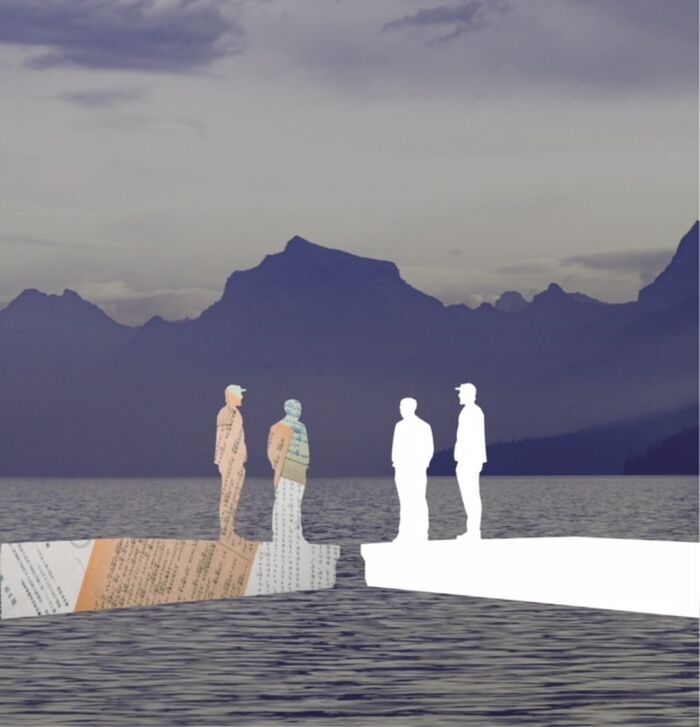Vita & Virginia Review
A deeply intimate and enthralling production

“Dear Mrs Woolf”, were the first words of a play which instantly establishes its script as a product of the very real exchange of letters between Virginia Woolf, and Vita Sackville-West. This, for me, was a risky concept: a play premised upon the letter as a literary form risks becoming stilted, or worse: failing to do justice to the actual correspondence between Vita and Virginia. This correspondence has, over time, become legendary: rarely has a written exchange between two individuals divulged so much about the complex personalities behind the pages, and rarely has such an exchange been so charged with the hidden expectation of love between two women within the context of an illiberal society of repressed homosexuality.
Perhaps, for this reason, I entered the Corpus Playroom with a number of reserves about the production as a whole. And yet, even as Vita (Corinne Clark) began her first address to Virginia (Emmeline Downie), what struck me was that on stage, the script felt less like the reading of a letter, and far more like a soliloquy. What we were watching was not the stilted reproduction of a monochromatic love affair, but the lively, effusive pouring out of the deepest sentiments of two women whose love affair has been analysed, deconstructed, but rarely brought to life again through the medium of the stage.
"perhaps the true pleasure in the viewing of the play lay in the chemistry between Vita and Virginia."
Indeed, every detail of the production’s visual presentation was carefully formatted in order to aid its epistemological exchange premise: a writing desk and shelves adorn Virginia’s side of the stage, whilst Vita’s luxurious couch sounds her aristocratic background. Neither set serves to detract from the speeches of the actresses, whilst also serving to create the sense of a physical divide between Vita and Virginia. Likewise, a series of clever light shifts darkens one side of the stage whilst brightening the other, drawing our attention to the speaker at that moment whilst also reaffirming the sense that we are watching a drawn out exchange of letters between the two lovers.
And yet, as meticulous and well-thought out as the staging was, perhaps the true pleasure in the viewing of the play lay in the chemistry between Vita and Virginia. Clark projects a Vita who is a ‘voluptuous aristocrat’ – seductive, exotic, deeply pensive, whilst Downie presents a charismatically intellectual Virginia – enigmatic, unpredictable and of course, deeply amusing. In a dualistic production, such as this one, there is always the risk that one actor or actress will outshine the other, and perhaps the beauty of Vita and Virginia is that neither Clark or Downie stole the other’s spotlight, instead choosing to adopt their own deeply convincing pastiches of the women who they portray. Sometimes their narratives overlap to complement each other, other times they present conflicting versions of events which are delightfully comic.
Even despite the fact that they are, of course, working from the words actually written by Vita and Virginia, the intimacy, emotion, and fragments of real life which Clark and Downie relay are almost tangible. One senses Virginia’s palpable frustration with Vita’s exotic travelling (of which she cannot be a part) whilst simultaneously engaging with Vita’s vexation regarding Virginia’s haughty engagement with haute-couture. Here, perhaps lies one small failing within the play: although the cast convincingly conveyed the emotional narrative between Vita and Virginia, at times the actual sequence of events was difficult to follow – I found that unfamiliar territory such as the detail of Vita’s travels was difficult to grasp, as well as the details of Vita’s affair with Dorothy Wellesley. But of course, this is only to be expected with a script adapted from the actual correspondence between Vita and Virginia, and although it highlights the difficulty of transposing letter onto stage, it also adds to the overall charm of the piece; this is a narrative which we are not supposed to follow to the letter (pun intended), but instead to admire from an outside perspective.
‘Vita, what a cornucopia of bounty you are,’ declares Virginia, and as an audience we are forced to agree; both Vita and Virginia’s letters are rich tapestries of intimacy and comedy, brought to life through two actresses and a director who appear to feel a genuine affinity with the figures they portray. Although admittedly not the most lively of plays, the theatrical beauty of the production lies in its stasis and subtlety: read between the lines to experience a piece which lays bare the poetic union between two extraordinary women.
 Arts / Plays and playing truant: Stephen Fry’s Cambridge25 April 2025
Arts / Plays and playing truant: Stephen Fry’s Cambridge25 April 2025 News / Candidates clash over Chancellorship25 April 2025
News / Candidates clash over Chancellorship25 April 2025 Music / The pipes are calling: the life of a Cambridge Organ Scholar25 April 2025
Music / The pipes are calling: the life of a Cambridge Organ Scholar25 April 2025 Comment / Cambridge builds up the housing crisis25 April 2025
Comment / Cambridge builds up the housing crisis25 April 2025 Comment / Pick an exam format and stick to it25 April 2025
Comment / Pick an exam format and stick to it25 April 2025






